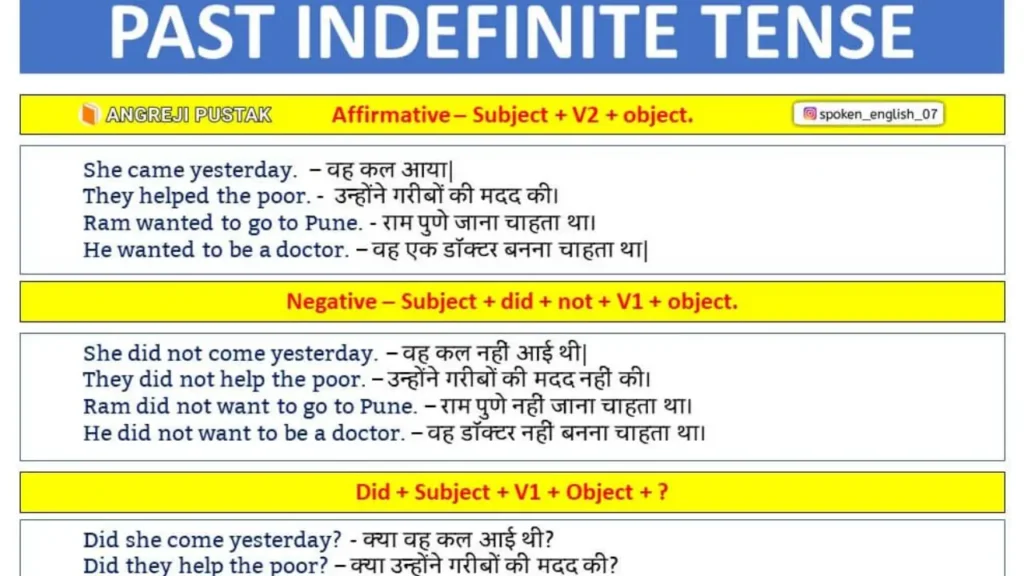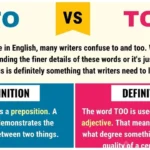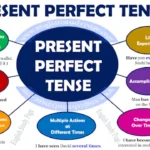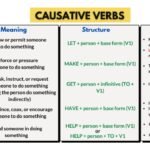Simple Past Tense| Past Indefinite Tense In Hindi: Simple Past Tense जिसे हिंदी में ‘सम्पूर्ण भूतकाल’ भी कहा जाता है, यह एक ऐसा टेंस है जो किसी कार्य या घटना को बयान करने के लिए उपयोग किया जाता है जो पहले हो चुका या पूरा हो चुका है। यह अंग्रेजी व्याकरण में Main Verb tense में से एक है और इसकी रचना और उपयोग सामान्यत: सरल होती है।
Positive – S + V2 + O
Interrogative – Did + S + V1 + O
Negative Interrogative – Did + S + not + V1 + O?
पहचानने के नियम
— जिस हिंदी वाक्य के क्रियाओं के अंत में ता था / ती थी / ते थे इत्यादि लगा रहे उसे Past Indefinite Tense का वाक्य माना जाता हैं|
Simple Past Tense में V2 का प्रयोग किया जाता है
Simple Past Tense में Affirmative Sentence में V2 का प्रयोग किया जाता है, जबकि Interrogative, Negative Interrogative में V1 का प्रयोग किया जाता है|
जैसे– Play- Played , Eat -Ate , Go -Went etc.
Verb के इन रूल्स को याद रखना बहुत ही जरुरी होता हिया जिसके बिना आप कोई भी इंग्लिश के सेंटेंस नहीं बना पायेंगे|
Note : Negative और interrogative Sentence को बनाने के लिए Helping Verb के रूप में Did + V1 लगाया जाता है|
V1 को V2 में कैसे बदले?
- Play (V1) – Played (V2) – खेलना – खेला
- Eat (V1) – Ate (V2) – खाना – खाया
- Go (V1) – Went (V2) – जाना – गया
- Come (V1) – Came (V2) – आना – आया
- See (V1) – Saw (V2) – देखना – देखा
- Take (V1) – Took (V2) – लेना – लिया
- Speak (V1) – Spoke (V2) – बोलना – बोला
- Drive (V1) – Drove (V2) – चलाना – चलाया
- Write (V1) – Wrote (V2) – लिखना – लिखा
- Run (V1) – Ran (V2) – दौड़ना – दौड़ा
Different Between Simple Present Tense and Simple Past Tense in Hindi
| Simple Present Tense | Simple Past Tense |
|---|---|
| उन क्रियाओं को व्यक्त करने के लिए उपयोग किया जाता है जो अभी हो रही हैं, नियमित रूप से घटित हो रही हैं, या आम तौर पर सत्य हैं। | उन क्रियाओं को व्यक्त करने के लिए उपयोग किया जाता है जो अतीत में हुई थीं और पूरी हो गई हैं या अब जारी नहीं हैं। |
| उदाहरण: “मैं खाता हूँ” (मैं खाता हूँ) या “वह गाता है” (वह गाता है)। | उदाहरण: “मैंने खाया” (मैंने खाया) या “उसने गाया” (उसने गाया)। |
| जिन वाक्यों के करिया के अंत में “-ता हूँ”, “-ता है”, “-ते हैं” आदि जैसे प्रत्यय जोड़े जाते हैं। | जिन वाक्यों के करिया के अंत में “-ए”, “-ए”, “-ई” आदि जैसे विशिष्ट प्रत्ययों के साथ चिह्नित किया जाता है। |
गलत और सही वाक्यों में अंतर In Simple Past Tense
| गलत वाक्य (Wrong Sentences) | सही वाक्य (Right Sentences) |
|---|---|
| He goed to the market yesterday. (उसने कल बाजार गया।) She eated lunch an hour ago. (उसने एक घंटा पहले लंच खाया।) They goed for a walk last night. (उन्होंने कल रात को सैर के लिए गया था।) I buyed a new phone yesterday. (मैंने कल एक नया फोन खरीदा।) We was at the party last weekend. (हम पिछले हफ्ते की पार्टी में थे।) She comed home late yesterday. (उसने कल देर से घर आया।) They was very happy with the result. (उन्हें परिणाम से बहुत खुशी हुई।) He writed a letter to his friend. (उसने अपने दोस्त को पत्र लिखा।) She catched the train on time. (उसने समय पर ट्रेन पकड़ ली।) I breaked my leg last year. (मैंने पिछले साल अपनी टांग तोड़ दी थी।) They eated dinner together. (उन्होंने साथ में रात का खाना खाया।) She speaked to him yesterday. (उसने कल उससे बात की।) He taked a bus to work. (उसने काम के लिए बस पकड़ी।) We forgetted to buy milk. (हम दूध खरीदना भूल गए।) She waked up early this morning. (वह आज सुबह जल्दी उठी।) They swimmed in the pool yesterday. (उन्होंने कल पूल में तैराकी की।) He teached English at the school. (उसने स्कूल में अंग्रेजी सिखाई।) She buyed a new dress last week. (उसने पिछले हफ्ते एक नई ड्रेस खरीदी।) They eated ice cream after dinner. (उन्होंने रात के खाने के बाद आइसक्रीम खाई।) I catched a cold last winter. (मैंने पिछले सर्दियों में ठंडी पकड़ ली थी।) | He went to the market yesterday. (उसने कल बाजार गया था।) She ate lunch an hour ago. (उसने एक घंटा पहले लंच किया था।) They went for a walk last night. (उन्होंने कल रात को सैर के लिए गए थे।) I bought a new phone yesterday. (मैंने कल एक नया फोन खरीदा था।) We were at the party last weekend. (हम पिछले हफ्ते पार्टी में थे।) She came home late yesterday. (उसने कल देर से घर आई थी।) They were very happy with the result. (उन्हें परिणाम से बहुत खुशी हुई थी।) He wrote a letter to his friend. (उसने अपने दोस्त को पत्र लिखा था।) She caught the train on time. (उसने समय पर ट्रेन पकड़ी थी।) I broke my leg last year. (मैंने पिछले साल अपनी टांग तोड़ दी थी।) They ate dinner together. (उन्होंने साथ में रात का खाना खाया था।) She spoke to him yesterday. (उसने कल उससे बात की थी।) He took a bus to work. (उसने काम के लिए बस पकड़ी थी।) We forgot to buy milk. (हमें दूध खरीदना भूल गया था।) She woke up early this morning. (उसने आज सुबह जल्दी उठा था।) They swam in the pool yesterday. (उन्होंने कल पूल में तैराकी की थी।) He taught English at the school. (उसने स्कूल में अंग्रेजी सिखाई थी।) She bought a new dress last week. (उसने पिछले हफ्ते एक नई ड्रेस खरीदी थी।) They ate ice cream after dinner. (उन्होंने रात के खाने के बाद आइसक्रीम खाई थी।) I caught a cold last winter. (मैंने पिछले सर्दियों में ठंडी पकड़ ली थी।) |
Story Of Simple Past Tense In Hindi
एक बार की बात है, एक छोटे से गाँव में एक लड़का रहता था। उसका नाम राम था। राम बहुत ही खुशमिज़ाज और मेहनती बच्चा था। वह हर दिन स्कूल जाता था और अपने पढ़ाई में बहुत मेहनत करता था।
एक दिन, राम के पास एक नया खिलौना था जिसे उसने बहुत दिनों से मंगवाया था। उसकी माँ ने उसे उसका पसंदीदा खिलौना दिया और उसने बहुत खुश होकर उसे बाहर लेकर खेलने लगा।
वह खेलते-खेलते, राम ने अपने खिलौने को गिरा दिया। वह बहुत दुखी हो गया और रोने लगा। उसने अपनी माँ को बताया और उसने उसको देखा और कहा, “बेटा, यह खिलौने की बात है। गिर जाते हैं। लेकिन तुम नहीं गिरे हो। तुम्हें उठाना सीखना होगा।”
राम ने अपनी माँ की बात मानी और उसने खिलौने को उठाया और फिर से खेलना शुरू किया। इस घटना ने राम को यह सीख दी कि जिंदगी में हमेशा अच्छा और बुरा दोनों होता है, लेकिन हमें कभी हार नहीं माननी चाहिए।

Rules and Uses:
[1.] A completed action having no effect on present is kept in past indefinite tense.कोई कार्य जो पहले ही पूरा हो चुका है, जिसका वर्तमान पर कोई प्रभाव नहीं पड़ता, उसेPast Indefinite Tense में रखा जाता है।
Example:
- Gandhi ji died in 1948. – गांधी जी 1948 में मर गए।
- She finished her homework yesterday. – उसने कल अपना होमवर्क समाप्त किया।
- They visited Paris last summer. – उन्होंने पिछले सर्दियों में पेरिस की यात्रा की।
- He completed his project two weeks ago. – उसने दो हफ्ते पहले अपना प्रोजेक्ट पूरा किया।
- She learned to drive when she was in college. – उसने कॉलेज में थी जब उसने गाड़ी चलाना सीखा।
- They ate dinner at 8 PM yesterday. – उन्होंने कल रात 8 बजे रात का खाना खाया।
- He played football every Sunday as a child. – वह बचपन में हर रविवार को फुटबॉल खेलता था।
- The train arrived late yesterday. – ट्रेन कल देर से आई।
- She danced beautifully at the wedding last night. – उसने कल रात शादी में खूबसूरती से नाचा।
- He broke his leg while skiing last winter. – उसने पिछले सर्दियों में स्की करते हुए अपनी टांग तोड़ ली।
[2.] To show a past habitual actions.- किसी पिछले आदतन कार्य को दर्शाने के लिए।
Example:
- She always woke up early. – उसकी हमेशा सुबह जल्दी उठने की आदत थी।
- He often visited his grandparents on weekends. – उसे अक्सर हर हफ्ते के अंत में अपने दादा-दादी के पास जाने का शौक था।
- They rarely went to the movies. – उन्हें फिल्में देखने जाना बहुत कम पसंद था।
- She never ate spicy food. – उसे कभी भी तीखा खाना पसंद नहीं था।
- He usually read a book before bed. – उसका आमतौर पर सोने से पहले किताब पढ़ना था।
- They seldom went on vacations. – उन्होंने अभ्यास से छुट्टियां बहुत कम बिताईं।
- She always helped her friends with their homework. – उसे हमेशा अपने दोस्तों के होमवर्क में मदद करने की आदत थी।
- He often played football after school. – उसे स्कूल के बाद अक्सर फुटबॉल खेलना पसंद था।
- She rarely missed her morning jog. – उसे सुबह की दौड़ में बहुत कम बार छूटा।
- He usually drank coffee in the morning. – उसका आमतौर पर सुबह कोफ़ी पीना था।
[3.] To show a past custom or ritual. – किसी पुराने रिवाज या अनुष्ठान को दर्शाना।
Example:
- They celebrated Diwali with great enthusiasm. – उन्होंने दीवाली को बड़े उत्साह से मनाया।
- We prayed together every morning. – हम हर सुबह मिलकर प्रार्थना करते थे।
- She wore traditional clothes on special occasions. – उसे विशेष अवसरों पर पारंपरिक कपड़े पहनने की आदत थी।
- He observed fasts during Ramadan. – उसने रमज़ान में रोज़े रखे थे।
- They attended the annual family reunion. – उन्होंने वार्षिक परिवार सम्मेलन में शामिल हुए।
- She performed the morning rituals diligently. – उसने सुबह की रीति-रिवाज़ को बड़े ध्यान से निभाया।
- He followed the tradition of giving gifts on birthdays. – उसने जन्मदिनों पर उपहार देने की परंपरा का पालन किया।
- They sang hymns at the temple every evening. – वे मंदिर में हर शाम भजन गाते थे।
- She practiced yoga daily. – उसने रोज़ योग का अभ्यास किया।
- He participated in community service every weekend. – उसने हर सप्ताह के अंत में समुदाय सेवा में भाग लिया।
[4.] To show a historical event.- किसी ऐतिहासिक घटना को दर्शाने के लिए।
Example:
- The Berlin Wall fell in 1989. – बर्लिन वॉल 1989 में गिर गयी।
- Shakespeare wrote many famous plays. – शेक्सपियर ने कई प्रसिद्ध नाटक लिखे।
- The Industrial Revolution changed society. – औद्योगिक क्रांति ने समाज को बदल दिया।
- Columbus discovered America in 1492. – कोलंबस ने 1492 में अमेरिका की खोज की।
- The French Revolution began in 1789. – फ्रांसीसी क्रांति 1789 में आरंभ हुई।
- Newton formulated the laws of motion. – न्यूटन ने गति के नियम स्थापित किए।
- Mahatma Gandhi led India’s independence movement. – महात्मा गांधी ने भारत के स्वतंत्रता आंदोलन की नेतृत्व की।
- World War I ended in 1918. – प्रथम विश्व युद्ध 1918 में समाप्त हुआ।
- The Renaissance began in Italy in the 14th century. – पुनर्जागरण 14वीं सदी में इटली में शुरू हुआ।
- The Great Depression started in 1929. – महान मंदी 1929 में शुरू हुई।
[5.] किसी वाक्य में कई घटनाओं का जिक्र हो और उसका main clause past me में रहे, तो उसकी सारी घटनाओं किसी न किसी past structure में जाने को विवश हो जाती हैं|
Sita said that she has bought a new car. (x) / Sita said that she had bought a new car. (✓)
Example:
- Ram said that he was going to Delhi. – राम ने कहा कि वह दिल्ली जा रहा था।
- She told me that she had visited her grandparents. – उसने मुझे बताया कि उसने अपने दादा-दादी को मिला था।
- They mentioned that they had finished their project. – उन्होंने बताया कि उन्होंने अपना प्रोजेक्ट पूरा किया था।
- He explained that he had solved the problem. – उसने समझाया कि उसने समस्या को हल कर लिया था।
- She confessed that she had broken the vase. – उसने स्वीकार किया कि उसने फूलदान तोड़ दिया था।
- They mentioned that they had seen the movie. – उन्होंने बताया कि उन्होंने फ़िल्म देखी थी।
- He recalled that he had met her at the party. – उसने याद किया कि उसने पार्टी में उससे मिला था।
- She confirmed that she had finished her studies. – उसने पुष्टि की कि उसने अपनी पढ़ाई पूरी कर ली थी।
- He acknowledged that he had made a mistake. – उसने स्वीकार किया कि उसने ग़लती की थी।
- She admitted that she had lost her keys. – उसने स्वीकार किया कि उसने अपनी चाबियाँ खो दी थी।
[6.] Always, Never, Seldom, Often, Rearly, Usually etc can be used in this tense we comes past habitual actions.- हमेशा, कभी नहीं, शायद ही कभी, अक्सर, शायद ही कभी, आमतौर पर आदि का उपयोग इस काल में किया जा सकता है जब हम आदतन कार्यों से गुजरते हैं।
Example:
- He always came late to the meetings. – उसे हमेशा मीटिंग्स में देरी होती थी।
- She seldom ate spicy food. – उसे शायद ही तीखा खाना पसंद था।
- They often visited their grandparents on weekends. – उन्होंने अक्सर हर हफ्ते के अंत में अपने दादा-दादी के पास जाते थे।
- She usually woke up early in the morning. – उसकी आमतौर पर सुबह जल्दी उठने की आदत थी।
- He rarely missed his gym sessions. – उसे बहुत कम बार जिम जाने से छूटती थी।
- They never forgot to celebrate her birthday. – उन्हें कभी भी उसका जन्मदिन मनाना नहीं भूलते थे।
- He always helped his friends with their homework. – उसकी हमेशा अपने दोस्तों के होमवर्क में मदद करने की आदत थी।
- She often went for a walk in the evening. – उसे शाम को बहुत बार सैर करने जाने की आदत थी।
- He rarely watched television during weekdays. – उसे सप्ताह के दिनों में टेलीविज़न देखने का बहुत कम शौक था।
- She usually cooked dinner for her family. – उसका आमतौर पर रात का खाना बनाने की आदत थी।
[7.] Last, Past, Ago, Before, Yesterday, Early, Previous, That time etc are used in this tense with completed actions.- इस काल में पूर्ण हो चुकी क्रियाओं के साथ अंतिम, भूतकाल, पहले, पहले, कल, शीघ्र, पिछला, वह समय आदि का प्रयोग किया जाता है।
Example:
- They bought a new car yesterday. – उन्होंने कल एक नई कार खरीदी।
- He finished his homework last night. – उसने कल रात अपना होमवर्क समाप्त किया।
- She met her friend a week ago. – उसने एक हफ्ते पहले अपनी दोस्त से मिली।
- He left for Paris early in the morning. – उसने सुबह जल्दी पेरिस के लिए रवाना हुआ।
- She called me just now. – उसने मुझे अभी-अभी फोन किया।
- They visited their grandparents a month ago. – उन्होंने एक महीने पहले अपने दादा-दादी के पास जाए।
- He completed his project last year. – उसने पिछले साल अपना प्रोजेक्ट पूरा किया।
- She called her parents yesterday. – उसने कल अपने माता-पिता को फोन किया।
- He met his friend an hour ago. – उसने एक घंटे पहले अपने दोस्त से मिला।
- She finished her exams a week ago. – उसने एक हफ्ते पहले अपनी परीक्षाएँ समाप्त कीं।
[8.] To avoid the repetition of would+V1 in a conditional sentence.- शर्वात वाले वाक्य में would+V1 की रिपीट वाले वाक्यों से बचने के लिए।
If i would to Delhi, i would buy a new car.(x) / If i went to Delhi, i would buy a new car. (✓)
Example:
- If she would come on time, she would not miss the bus. – अगर वह समय पर आती, तो उसे बस नहीं छूटती।
- If he went to the market, he would buy some fruits. – अगर वह बाजार गया, तो उसने कुछ फल खरीद लेता।
- If they studied harder, they would pass the exam. – अगर वे मेहनती से पढ़ते, तो उन्हें परीक्षा में पास हो जाते।
- If she wrote down the recipe, she could remember it. – अगर उसने रेसिपी लिख ली, तो उसे याद रह सकती थी।
- If he took the earlier flight, he would reach on time. – अगर उसने पहले फ्लाइट ली, तो उसे समय पर पहुंच जाता।
- If they listened to their parents, they would not get into trouble. – अगर वे अपने माता-पिता की बात मानते, तो उन्हें मुसीबत में नहीं पड़ना पड़ता।
- If she had more money, she would buy a new car. – अगर उसके पास और पैसा होता, तो वह एक नई कार खरीदती।
- If he went to bed early, he would not feel tired in the morning. – अगर वह जल्दी सोता, तो उसे सुबह थकावट महसूस नहीं होती।
- If they arrived on time, they would not miss the beginning of the movie. – अगर वे समय पर पहुंचते, तो उन्हें फिल्म की शुरुआत नहीं छूटनी पड़ती।
- If she had practiced more, she would have won the competition. – अगर उसने और अधिक प्रैक्टिस की होती, तो वह प्रतियोगिता जीत लेती।
[9.] I wish / It is high time / It is the time / It is went / If as it etc + S + were/V2 +….. (Past Indefinite)- काश / यह सही समय है / यह समय है / यह चला गया / यदि जैसा वाक्यों के लिए|
I wish! I go to Delhi. (x) / I wish! I went to Delhi, (✓)
Example:
- I wish I had known about the meeting earlier. – मैं चाहता था कि मुझे मीटिंग के बारे में पहले पता होता।
- It is high time he went to bed. – उसके लिए अब समय है कि वह सो जाए।
- It is the time they cleaned the house. – अब समय है कि वे घर को साफ करें।
- If I were you, I would not worry about it. – अगर मैं आपकी जगह होता, तो मुझे इसकी चिंता नहीं होती।
- I wish it were sunny today. – मैं चाहता था कि आज सूरजमुखी होता।
- If it were possible, I would help you. – अगर यह संभव होता, तो मैं तुम्हारी मदद करता।
- I wish she were here right now. – मैं चाहता कि वह अभी यहाँ होती।
- It is high time they made a decision. – उनके लिए अब समय है कि वे एक निर्णय लें।
- If it were not for her help, we would have failed. – अगर उसकी मदद न होती, तो हम असफल हो जाते।
- I wish it were Friday already. – मैं चाहता था कि अब पहले ही शुक्रवार होता।

Simple Past Tense in Affirmative, Negative, Interrogative, WH Question and Interrogative Negative Sentence In Hindi
- Affirmative Sentences (सकारात्मक वाक्य)
- Negative Sentences (नकारात्मक वाक्य)
- Interrogative Sentences (प्रश्नात्मक वाक्य)
- WH Question (व्ही-प्रश्न)
- Interrogative Negative Sentence Sentences (प्रश्नात्मक नकारात्मक वाक्य)
Affirmative Sentences (सकारात्मक वाक्य)
Example:
- She played tennis. – उसने टेनिस खेला।
- They visited Paris last summer. – उन्होंने पिछले सर्दी में पेरिस की यात्रा की।
- He finished his homework. – उसने अपना होमवर्क समाप्त किया।
- The dog barked loudly. – कुत्ता जोर से भौंका।
- She graduated from university. – उसने विश्वविद्यालय से स्नातक किया।
- We watched a movie yesterday. – हमने कल एक फिल्म देखी।
- They ate dinner together. – उन्होंने साथ में रात का खाना खाया।
- He bought a new car. – उसने एक नई कार खरीदी।
- She read a book last night. – उसने कल रात एक किताब पढ़ी।
- They played football in the park. – उन्होंने पार्क में फुटबॉल खेला।
Negative Sentences (नकारात्मक वाक्य)
Example:
- She did not play tennis. – उसने टेनिस नहीं खेला।
- They did not visit Paris last summer. – उन्होंने पिछले सर्दी में पेरिस नहीं गए।
- He did not finish his homework. – उसने अपना होमवर्क नहीं समाप्त किया।
- The dog did not bark loudly. – कुत्ता ज्यादा जोर से नहीं भौंका।
- She did not graduate from university. – उसने विश्वविद्यालय से स्नातक नहीं किया।
- We did not watch a movie yesterday. – हमने कल फिल्म नहीं देखी।
- They did not eat dinner together. – उन्होंने साथ में रात का खाना नहीं खाया।
- He did not buy a new car. – उसने एक नई कार नहीं खरीदी।
- She did not read a book last night. – उसने कल रात एक किताब नहीं पढ़ी।
- They did not play football in the park. – उन्होंने पार्क में फुटबॉल नहीं खेला
Interrogative Sentences (प्रश्नात्मक वाक्य)
Example:
- Did she play tennis? – क्या उसने टेनिस खेला?
- Did they visit Paris last summer? – क्या उन्होंने पिछले सर्दी में पेरिस गए थे?
- Did he finish his homework? – क्या उसने अपना होमवर्क समाप्त किया?
- Did the dog bark loudly? – क्या कुत्ता जोर से भौंका?
- Did she graduate from university? – क्या उसने विश्वविद्यालय से स्नातक किया?
- Did we watch a movie yesterday? – क्या हमने कल फिल्म देखी थी?
- Did they eat dinner together? – क्या उन्होंने साथ में रात का खाना खाया?
- Did he buy a new car? – क्या उसने एक नई कार खरीदी?
- Did she read a book last night? – क्या उसने कल रात एक किताब पढ़ी थी?
- Did they play football in the park? – क्या उन्होंने पार्क में फुटबॉल खेला था?
WH-Questions (व्ही-प्रश्न)
Example:
- What did she play? – उसने क्या खेला?
- Where did they visit last summer? – उन्होंने पिछले सर्दी में कहाँ जाया था?
- Why did he finish his homework? – उसने अपना होमवर्क क्यों समाप्त किया?
- How did the dog bark? – कुत्ता कैसे भौंका?
- When did she graduate from university? – उसने विश्वविद्यालय से कब स्नातक किया?
- What movie did we watch yesterday? – हमने कल कौनसी फिल्म देखी?
- Who did they eat dinner with? – उन्होंने रात का खाना किसके साथ खाया?
- Which car did he buy? – उसने कौनसी नई कार खरीदी?
- What book did she read last night? – उसने कल रात कौनसी किताब पढ़ी?
- Where did they play football? – उन्होंने कहाँ पार्क में फुटबॉल खेला?
Interrogative Negative Sentences (प्रश्नात्मक नकारात्मक वाक्य)
Example:
- Didn’t she play tennis? – क्या उसने टेनिस नहीं खेला?
- Didn’t they visit Paris last summer? – क्या उन्होंने पिछले सर्दी में पेरिस नहीं गए थे?
- Didn’t he finish his homework? – क्या उसने अपना होमवर्क नहीं समाप्त किया?
- Didn’t the dog bark loudly? – क्या कुत्ता ज्यादा जोर से नहीं भौंका?
- Didn’t she graduate from university? – क्या उसने विश्वविद्यालय से स्नातक नहीं किया था?
- Didn’t we watch a movie yesterday? – क्या हमने कल फिल्म नहीं देखी थी?
- Didn’t they eat dinner together? – क्या उन्होंने साथ में रात का खाना नहीं खाया था?
- Didn’t he buy a new car? – क्या उसने एक नई कार नहीं खरीदी थी?
- Didn’t she read a book last night? – क्या उसने कल रात एक किताब नहीं पढ़ी थी?
- Didn’t they play football in the park? – क्या उन्होंने पार्क में फुटबॉल नहीं खेला था?
Daily Rutting Of Simple Past Tense In English
Rahul woke up at 6 AM every day. He brushed his teeth, took a shower, and got dressed for work. After that, he had a quick breakfast of toast and coffee. Then, he grabbed his bag and left the house at 7 AM.
At work, Rahul checked his emails and attended a morning meeting. He worked on different projects throughout the day, taking short breaks for lunch and coffee. In the afternoon, he had another meeting with his team to discuss progress.
After work, Rahul went to the gym for an hour-long workout. He enjoyed lifting weights and running on the treadmill. By the time he finished, it was already 7 PM. He headed home, cooked dinner, ad watched TV for a while before going to bed at 10 PM.
This was Rahul’s daily routine during the week. On weekends, he liked to relax, go for hikes, or meet friends for coffee.
Frequently Asked Questions Of Simple Past Tense
- What is the simple past tense?
The simple past tense is used to describe actions that happened at a specific time in the past and are now completed.
2. How do you form the simple past tense in English?
For regular verbs, you typically add “-ed” to the base form of the verb (e.g., walked, talked). For irregular verbs, the past tense forms vary (e.g., went, ate).
3. When do you use the simple past tense?
You use the simple past tense to talk about actions or events that occurred at a definite time in the past, completed actions, or past habits.
4. Can you give examples of sentences in the simple past tense?
Sure!
I went to the store yesterday.
She studied hard for her exams last week.
They played football every weekend when they were kids.
5. How do you make negative sentences in the simple past tense?
Use the auxiliary verb “did” (in the past tense) + “not” + the base form of the verb.
Example: I did not finish my homework on time.
6. What are signal words or phrases that indicate the simple past tense?
Signal words include: yesterday, last week, in 1999, ago, when I was a child, etc.
7. Can the simple past tense be used for ongoing actions in the past?
No, the simple past tense is used for actions that are completed and have no relation to the present.
8. Do all verbs follow the same pattern in the simple past tense?
No, while regular verbs generally add “-ed” (or sometimes just “-d”) to form the past tense, irregular verbs have unique past tense forms that must be memorized.
9. Is there a difference between “did” and “was/were” in forming questions in the simple past tense?
Yes, “did” is used to form questions with regular and irregular verbs (e.g., Did you go? Did they eat?), whereas “was” and “were” are used for questions with the verb “to be” (e.g., Was he there? Were they happy?).
10. Can adverbs of time be used with the simple past tense?
Yes, adverbs of time such as yesterday, last night, three days ago, etc., are often used to specify when an action happened in the past.
Read Also;
- 100 Sentences Of Present Perfect Tense In Hindi
- Present Perfect Continuous Tense In Hindi: Rules, Structure and Examples
- 100 Sentences Of Present Continues tense In Hindi
- Present Perfect Tense सीखे हिंदी में | परिभाषा, नियम और उदहारण के साथ
- Present Continuous Tense के बारे जाने डिटेल्स से, रूल्स, स्ट्रक्चर और एक्साम्प्लेस के साथ






